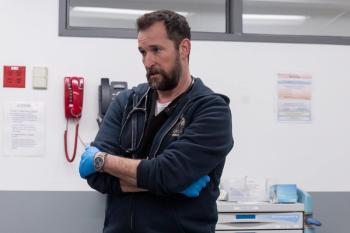
Northwell Health gun violence forum aims to get hospital leaders more involved
The fifth annual event hailed progress in drawing more attention to gun deaths as a public health threat, and growing interest from healthcare executives to take action.
As he began Northwell Health’s fifth annual forum on gun violence,
“There are more people recognizing the fact that this is a society that should never be able to use the statistic that
Northwell hosted a series of discussions Tuesday featuring healthcare leaders, federal officials, and elected leaders. Former President Bill Clinton delivered the keynote address, imploring leaders to continue working to reduce gun deaths.
“Don't give up on anybody,” Clinton said. “Keep plugging away. And mostly don't give up on yourself. What you are doing is worthy, good, noble. It is making a difference.”
Dowling has long been pushing hospitals to become more vocal and active in the fight to reduce gun violence. He helped form the National Health Care CEO Council for Gun Violence Prevention and Safety in 2022.
“I have a belief that the healthcare organization leadership have a special obligation and responsibility to get beyond providing medical care on a daily basis, but to be involved in being a positive influence in societal issues, and there is nothing more important obviously than gun violence,” Dowling said.
‘A lot more collaboration’
When he first began the forums, Dowling noted that some hospital leaders were wary of wading into an issue that stirs fierce debate, and some were leery of upsetting members of their boards of directors. “I remember when we started back then, it was a lot of skepticism,” Dowling said.
“Organizations are doing things today that they did not do before,” Dowling said. “So many of those entities that suggested back then that we shouldn't be involved are now directly involved. There's been a lot more collaboration, people working together more so than ever before.”
Dowling pointed to a group of hospitals and health systems in the Philadelphia region that have come together to launch
Even with the all-too-familiar headlines of fatal shootings, Dowling encouraged those in attendance, and more than 2,000 watching the forum virtually, to understand that they are making a difference.
“It is very important to recognize that along the way, we're making some positive change,” Dowling said. “That's how you inspire others to get involved. It's not a lost cause.”
Intermountain Health CEO Rob Allen, who participated in the forum, said it’s important to tackle gun violence as a public health problem without making it a political debate. Allen is one of the CEOs on the national council on gun violence.
“When we think about gun safety, the reality is …. it is a health issue,” Allen said. “It's a wellness issue. It's not a political issue. My biggest worry is it gets politicized and already has been. I think the biggest travesty during the pandemic was it became politicized instead of focusing on caring for each other and the realities we were facing.”
Intermountain serves patients in seven states in the west, where gun ownership is very common. The health system is focused on preventing deaths by suicide involving firearms, and has worked on suicide prevention training. “We've trained 30,000 of our caregivers in suicide prevention techniques,” Allen said. “We've provided avenues for free training to our communities in English and in Spanish around suicide prevention techniques.”
‘Special obligation’
Jim Ross, the mayor of Arlington, Texas, acknowledged he brought a different background than many at the forum. Ross served in the Marines and is a former police officer, and he acknowledges he’s a gun owner. “I've known what it's like to be a part of gun violence,” Ross said. “And that's why I'm blessed to be invited to come here and share my story and talk about the importance of taking small bites out of that apple, little ones at a time.”
Ross encouraged hospital and healthcare leaders to get involved in the effort to reduce gun violence. He joked that they bring much more credibility to the fight than he does as an attorney and a politician.
“When you all speak, it matters,” Ross said. “So that's why this type of forum is so critically important is because you bring with you this inherent sense of trust.”
Rob Wilcox, deputy director of the White House Office of Gun Violence Prevention, urged hospital leaders to speak out more and take steps to reduce gun violence, including raising awareness about the need to securely lock up firearms. He also talked about the value of hospital violence intervention programs, which can direct victims to community services.
“I think the health system is one of the most significant partners in addressing this issue,” Wilcox said.
Dowling highlighted the “special obligation” healthcare leaders have to work to reduce gun violence.
“We have influence in our communities,” Dowling said. “We for the most part are the largest employers in our communities …. and therefore we have to speak out about health. Gun violence is a health issue.”





























































































